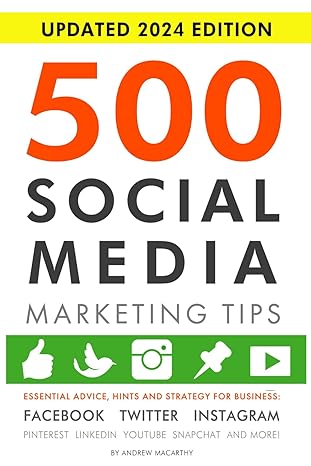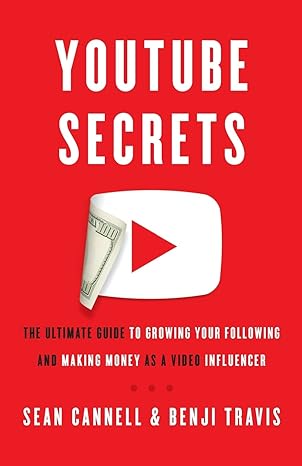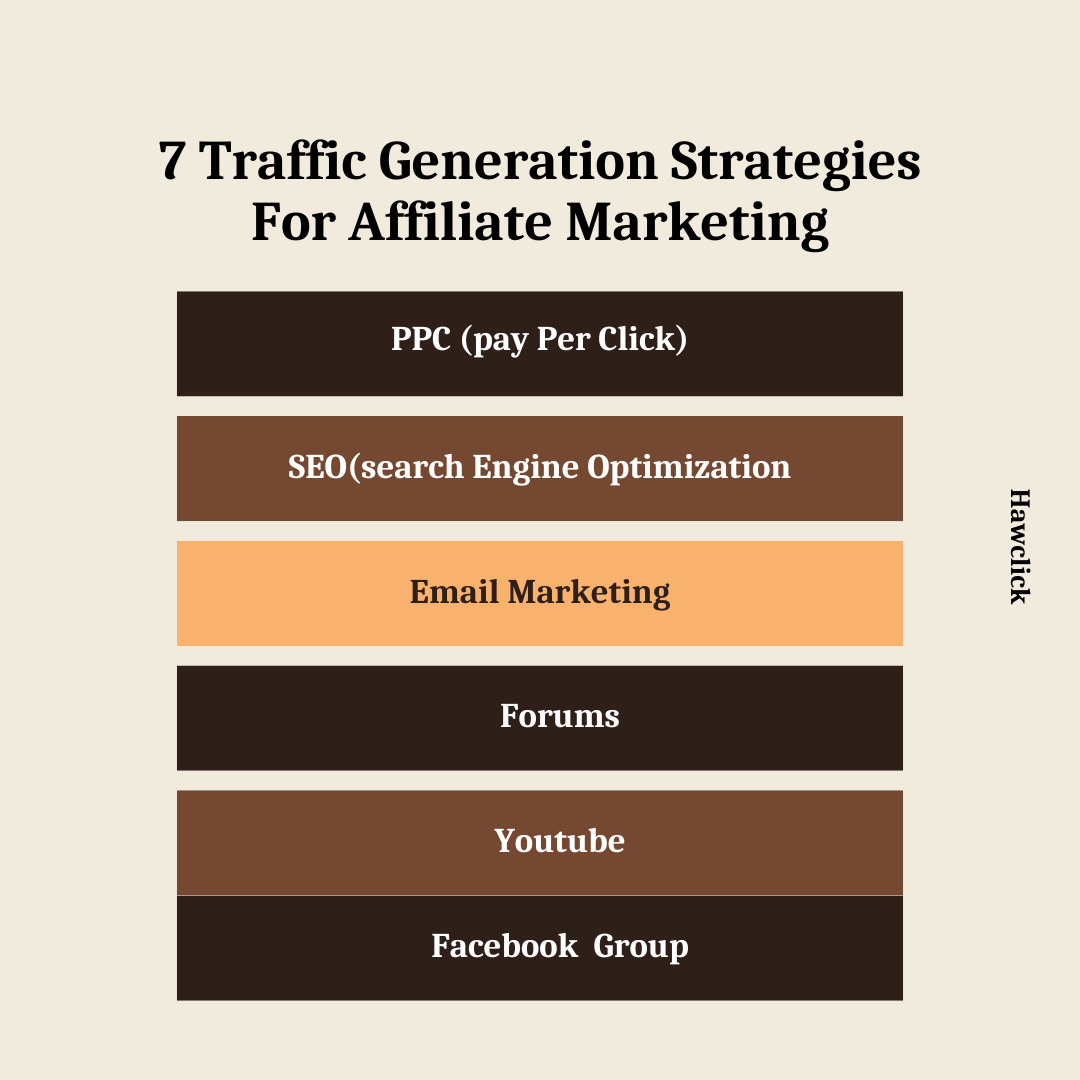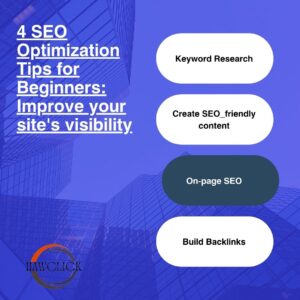In this blog post, I’ll be running through 7 traffic generation strategies for affiliate marketing. Some are paid, and some are free. You can pick which one, whatever suits you the best, but I’ll be running through all of that in this article. And then I’ll also be giving you my recommendation on the best traffic generation source that you should be using.
7 Strategies For Affiliate Marketing
I want to walk you through seven different marketing strategies that you can use to generate traffic for your affiliate marketing offers
- PPC
- SEO
- Email marketing
- Forums
- Social Media
- Facebook groups
- Youtube
PPC (pay Per click) strategy
The first traffic generation strategy for affiliate marketing I want to run you through is called PPC. PPC stands for pay per click, and as it sounds is a marketing strategy where you pay for every click you generate. The most typical way that affiliate marketers use PPC to generate sales is by using Google’s ad platform called Google Ads. Google Ads is Google’s advertising system in which advertisers bid on certain keywords in order for their clickable ads to appear in the Google search results.
For example, if you have an affiliate website reviewing the best gaming chairs, then you could create an ad and show it at the top of Google search results whenever someone types in best game chairs. And as you can see, those ads appear right at the top of Google. What’s also
really important to know is that you only pay Google when someone clicks on your ad. So if someone carries out a search for the best gaming chairs and they don’t click on your ad, then you do not have to pay any money. And you can also set a maximum cost per click, also known as a CPC as well, which is pretty much the maximum amount of money that you are willing to pay for a click. I will say this is the best traffic generation strategy for affiliate marketing.
What are the pros and cons of PPC as one of the strategies for affiliate marketing ?
Pros
1. PPC, you can generate traffic literally straight away. You can go into Google Ads, create an ad, and literally within an hour start to generate some clicks to your affiliate offers.
2. PPC allows you to generate targeted traffic. You can tell Google what search terms, in particular, you would like your ads to show for. Of course, you wouldn’t create any ads for any irrelevant search terms.
3. you don’t always need a website too. You can literally create a Google Ad and send the traffic directly to your affiliate
offer. Whether that’s your affiliate link on Amazon or your affiliate links landing page, the choice is completely down to you.
Cons
1.The first con of PPC is that clicks can be very, very expensive. Now to give you an idea, obviously its going to vary depending on what keywords you are targeting in what areas as well, but pretty much if I was to bid on any SEO-related keyword for my agency clickslice such as SEO agency London, or SEO consultant London, I can literally be spending £20 a click, which is absolutely insane, although SEO is notoriously known to be the most expensive keywords to bid on, especially in the digital industry.
2.The second con of PPC is that it can be harder to justify a positive ROI. And the main reason for this is that you’ll generate sales from your affiliate website, which will be your revenue. However, you’ll then have to deduct a massive amount, which is going to be the investment that you use to generate those clicks. So that can definitely eat into your margin and make it harder to justify an ROI.
3.The third con of PPC is that it’s typically not sustainable as well. You really need to be asking yourself, do you want to invest in a marketing channel, which will literally stop bringing in results as soon as you stop paying for clicks. So that is quite a big con of PPC as its not really that sustainable.
SEO (Search Engine Optimization)
SEO stands for search engine optimization. And SEO is pretty much the opposite of PPC. SEO involves ranking your website at the top of Google in the organic section and generating free website traffic. And in addition to this, a lot of people actually have more trust for the websites in
the organic section, as they understand that they are there organically and they’re not paying to be there, which is what the websites in the paid ad section are doing. But just to clarify, when you appear in the organic SEO section, you do not pay for any clicks. SEO is undoubtedly one of the best strategies for affiliate marketing
What are the pros and cons of SEO as one of the strategies for affiliate marketing ?
Pros
1. Free traffic: You are not paying for any clicks out there. It’s also very targeted traffic as well, as you can literally optimize your website to only appear for specific search terms, which of course will be related to your website.
2. SEO is sustainable. It is not like Google Ads in the essence that when you stop paying for SEO or stop doing SEO, your website is going to
completely disappear instantly just as your Google AdWord. SEO is sustainable and the results are long-lasting, and they also compound over time as well.
3.Another pro of SEO is that it typically leads to higher conversion rates, too. This actually relates to my other point of just users having more trust in websites that appear in the organic section.
4. SEO gives you the opportunity, if you want, to sell your website for a 34X multiple. The reason why you have the opportunity with SEO and not Google Ads for example is that your website is the core asset. Your website, and your high Google rankings, all lead to free traffic. Whereas if your whole traffic source is based on a paid strategy, such as Google Ads, well, when you sell your website, you are not selling the Google Ads account with it. We have a lot of costs associated with it as well.

CONS
1. the first con of SEO is that you need a website. Of course, to rank in the organic section, you are going to need a website. You can’t just use a standard landing page, or even just send traffic directly to the affiliate offer as you could do with Google Ads, you will need your own website and it will need to be ranking Google.
2. second con. SEO takes time to kick in, especially if you’re building a website on a brand new domain, which has no trust or authority from Google. Typically, it can take between six to eight months to generate sustainable results. You can get results a lot quicker. Again, it all depends
on the keyword you’re targeting and the competition you’re up against.
Email Marketing
Email marketing is the act of using email to promote your business’ products or services. As affiliates, we would be promoting the products or
services of other businesses. This is one of the strategies for affiliate marketing that gives you a long chain of customers. the more the lead, the more the sales.

What are the pros and cons of Email Marketing?
Pros
1. Well, the biggest pro of email marketing is that you can pretty much get instant sales. Right. If you already have a big email list, you can send out an email to your email list with an offer and people can buy it instantly.
2. The second benefit of email marketing, which is pretty much the most important one is that you own your list. Your list is the asset.
If you are setting up Google Ads, well, Google could literally ban your account. When you’re doing SEO, Google could also ban your website from the Google search results. I mean, it’s very, very unlikely, but when you own your own email list, you own the asset and pretty much no one can take that away from you. If you’re using MailChimp, for example, to send emails and they ban you, well, you can take your email list and send your emails from another email software. So when it comes to email marketing, you pretty much own the core asset.
3.Another benefit of email marketing is that it has one of the best conversion rates out there in comparison to any other traffic source. This is pretty much because everyone on your email list would’ve subscribed to you to receive your emails. So they already trust you.
4. And lastly, the fourth benefit of email marketing as a traffic source is that you can pretty much automate the process. And what I mean by that is you can literally create one email, kind of like your template, and then automatically the email software such as MailChimp will send that email
to everyone on your email list. You do not have to sit there and send emails one by one manually. It is definitely not a painstaking task.
Cons
1. Well, the first con is pretty much what holds most people back. Building up an email list is not easy. You’ve probably seen loads of gurus online
saying, build up an email list, build up an email list, and as you know, it involves you’re giving away tons of value upfront earning that person’s trust in exchange for their email address. So you can’t just simply say, Hey, sign up to my email list and hope people will sign up.
Unfortunately, it does not work that way. To get people on your email list, you need to provide value to them, and then they may sign up.
2. The second con is that building up an email list takes a long time. If you only have 10 people on your email list, well, you’re not going to generate that much affiliate revenue. To generate real solid, tangible results. You want to have at least 1000 people on your email list.
3. The third con of email marketing is that you only generate sales when you send an email. Whereas if you have a Google Ad campaign going, or you’re doing SEO and you’re ranking highly in Google, you have the potential to generate sales, literally 24/7, 365 days a year. Email marketing does not give you that opportunity.
Forums
Strategy number four, forums. Forums are pretty much an online discussion board where people can ask questions, share their experiences and discuss topics of mutual interest. You can actually use targeted forums to generate affiliate marketing sales. And the way you do that is by
finding forums related to the products or services that you want to be an affiliate for. , but for now you just need to understand that forums can
be used as one of the valid strategies for affiliate marketing traffic source to generate affiliate marketing sales. Some of the most popular forums out there are Quora and Reddit. You probably would’ve heard of these two. There are lots and lots more forums out there, especially when you start to niche down in a specific topic.
What are the pros and cons of forums as one of the strategies for affiliate marketing ?
Pros
1.Well, the first pro is that they work incredibly well when you provide value upfront. If you could join one of these forums, provide value and earn
the trust of people in this forum, they will pretty much live and swear by what you say. And that can result in a lot of affiliate commissions.
2. The second pro is you can leverage the domain authority of the forum as well. Well, the great thing about these forums like Reddit and Quora is they have tons and tons of domain authority. Google already trusts their websites, which means that when people post questions, these forum threads actually rank really high in Google. So you can generate free traffic without having to spend or invest any time in the SEO of your website. So that’s actually a really good benefit of using forums as a traffic source. 4 Strategies for affiliate marketing.
3.The third benefit of forums is that it’s an effective long-term strategy as well. It is not like Google Ads where you have to pay for an ad, and as soon as you stop paying your ad disappears. Once you post your message to your affiliate link in a forum, once you’ve established trust, you can pretty much get sales on a consistent basis for the foreseeable future.
Cons
1. The first con of a forum is that not all posts are auto-approved. If you are completely new to forums and you want to join one straight away, some of them do have strict requirements that you need to engage in a few people’s posts before you can create your own thread. So that can actually delay things when you’re trying to generate affiliate commissions very, very quickly.
2. The second con is that income is directly linked to the number of forums. If you are operating in a very specific niche, then you may find that there are not that many forums out there. Meaning if you use this as your main traffic source, your income is going to be pretty much capped. Right.
As there are only so many forums you can join to generate affiliate commissions from.
3. The third con of forums is that you do not own the property. This is really important to stress. You can spend all this time and all these hours posting in these forums, and if they decide to delete your post or delete your account, then all of your hard work is gone. When you decide to
use a traffic source such as SEO while you own your website, so no one can directly delete your post or your website, other than you.
Social Media
Moving onto strategy five, which is social media. So social media is another good marketing strategy you can use to generate affiliate sales. The strategy here involves you creating content for popular social media platforms, such as Facebook, Twitter, Instagram, Snapchat, and TikTok.
And you can do this in many ways, such as reviewing a product, telling everyone how awesome it is, and then tell them to swipe up or click the link to buy one of those same products too. And then in that description below, or when they swipe up, you will plug your affiliate link. That is what people will click on, and that will allow you to generate your affiliate sales.

pros and cons of social media
pros
1.Well, the first pro of using social media is that you can pretty much get instant sales. You can share your affiliate link online and get a sale literally
within two minutes. So social media can be very, very good. Another benefit of social media is that the traffic is free.
You do not have to pay for any clicks, none of that. Well, of course, you can, if you want, but social traffic is free. So it’s instant sales and it is free. It can be very, very appealing.
cons
1.Well, the biggest con of social media is that to get good results, you need to have an audience. If you just have, let’s say five followers on Twitter and you post a link to one of your affiliate offers, well, don’t expect to get any sales as you need to have followers in the thousands and I mean the thousands to generate tangible results. And in addition to this, I didn’t actually include it as another point, but generating an audience and a following a social media takes a lot of time as well. It’s pretty much similar to the email marketing cons.
2. The second con of social media is that you do not own the property. How many audiences or influences have you seen that are really big on social media and then all of a sudden they tweet something which they shouldn’t say, and they end up getting temporarily banned, which has a massive negative impact on that person’s income. Of course, you can reduce the chances of this happening by following all the terms and conditions and making sure you’re not violating any policies, but it’s just something to be aware of, you do not own the property. So your tweets and profile can be deleted at any time.
3.The third con of social media, which is probably the most important one in my personal opinion is that social media posts have a very short shelf life. Meaning how many times have you gone back to look at the same tweets or the same posts on Facebook, Snapchat, Instagram, and TikTok. It doesn’t really matter. Typically, when you see something on social media, you see it right there and then in the moment, which means when you translate that over to business, when you do your post, that is when the majority of your sales will come in. Pretty much within 24 hours of your post going live, you won’t be generating that many sales unless it goes viral. But even then that is going to die down over time. So it’s not really a long-term strategy.
4. Another con of social media is that conversion rates are not the best. If you compare social media to SEO, for example, when you go into Google and carry out a search for, let’s say, best gaming chairs, you are showing intent that you want to look for the best gaming chairs.
However, if you just share a link to gaming chairs on your social media platforms, you can’t guarantee that all of your followers are interested in gaming chairs, let alone currently looking for the best gaming chair. So conversion rates by default are always going to be on the lower end.
Facebook Groups
Strategy number six, Facebook groups. Facebook groups is quite similar to the forum strategy in the essence that it works in the same way, but essentially how you can use Facebook for affiliate marketing is you need to find and join niche-specific Facebook groups related to the niche of the products that you are promoting.
So the whole idea here is you want to join these groups, build up trust and slowly start to plug your affiliate links. Again, don’t worry too much about the finer details as I’m going to go through all of this later on in the course. The point of this video just here is to go through the seven
different traffic sources that you can use to generate affiliate sales. So, as I was saying, you could find these running-related Facebook groups, join them, provide value, build trust, and then plug your affiliate links.
So what are the pros and cons of Facebook groups?
Well, as I said, it’s pretty similar to forums. So the pros and cons are also very similar. They work incredibly well when providing value. It’s
an effective long-term strategy.
The cons again, the same as forums, not all posts are auto-approved. Some posts actually need approval from the moderators of that Facebook
group. And if they don’t like the look of your post or they see an affiliate link, then that can be a problem. And of course, the income is directly linked to the number of members in that group. If you join a really niche-specific group, but it’s got 100 members, well, your income is going to be
limited.
The third con of Facebook groups is that not all groups actually allow affiliate links. I’ve come across some really good Facebook groups in the past. I thought they’d be the perfect fit for me.
However, in the Facebook rules of that group, they say no affiliate links are allowed. I mean, I even tried to pay the owner to allow me to post an affiliate link, but he was not up for it. But yeah, something to be aware of.
And lastly, another con of Facebook groups is that you do not own the property. You can also get removed from the group by the owner if they don’t like your post as well, which can have a big impact on your income if you’re just relying on Facebook groups. So again, some very valid points to be aware of.
Youtube
Moving onto the seventh and final strategy, which is YouTube. YouTube is arguably one of the strategies for affiliate marketing that have the biggest barrier to entry and generating affiliate sales from YouTube, there is a lot of work that goes into it, such as planning out the videos, recording them, editing them, uploading then promoting them. It’s a big process for sure. Trust me any video work is not easy. I know that from making this course right here. But pretty much to generate sales from YouTube, you would review the product and give your thoughts and feedback on them to other people who are also potentially interested in buying the same thing. And then you would include an affiliate link in a description of the video, which is how you’d make your money.
And for those who didn’t actually know, YouTube is also owned by Google and is the second biggest search engine out there. So there’s a lot of traffic you can generate from YouTube and you obviously make your money as I said, by including your affiliate links in the description below the video. I’m sure you’ve all watched those videos on YouTube before where they say, check out the link and description 9 out of 10 is going to be an affiliate link.

what are the pros and cons of YouTube as one of the strategies for affiliate marketing ?
pros
1. YouTube is actually owned by Google and is the second biggest search engine out there. So your income potential is really, really high, especially if you get one video growing viral, all you just manage to do really, really well.
2. The second benefit of YouTube is that it’s easier to build trust with viewers. And the reason why it is instead of just reviewing a product that people may think you have, or don’t actually have in your hands, people can see from the video, that you have the product in your hands and you have real hands-on experience, so they’re more likely to trust your word in regards to what you’re saying about the product. And that can also have a positive impact on your conversion rate as well.
3.The third pro of YouTube is you don’t need to waste time setting up a website. You can pretty much just create your channel, include your affiliate links in the description and make sure you link directly to the affiliate offers. You don’t even have to bother to set up your website and add your affiliate links on them. You can send traffic directly to the source.
4.Another benefit of YouTube as a traffic source is that brands can also reach out to you if they see your channel doing very well. Now, it’s more common that brands to reach out to people on YouTube than any other traffic source. And I believe it’s because as we are seen in the data recently, YouTube has just grown at an unprecedented rate. And like I’ve already said multiple times, it’s owned by Google. So it
seems to be a lot of money going the YouTube way.
Cons
1.It has the highest barrier to entry. Now, when I say the highest barrier to entry, what I mean by that is it’s a lot more challenging to use YouTube as a traffic source in comparison to the other six strategies. There’s the planning you have to sort out, record the video, edit, upload, and promote. There’s
so much you have to do to get a successful YouTube channel.
2.The second conc to YouTube is that as you’ve probably already heard from people you know personally, is that growing a YouTube channel takes a long time. And that does not happen magically overnight. I would say it’s pretty similar to SEO. It doesn’t happen overnight. However, typically it will take longer to get results from YouTube than it will take you from using SEO as a traffic source.
So that is all of the seven Traffic Generation strategies for affiliate marketing. You may be finding it a little bit confusing to pick one to go
forward with as they all have their own pros and cons. However, don’t worry if you are a little bit
confused, as in the next video, I’ll be going over, which one I recommend that you should focus
on to generate the best results. See you there.





Pingback: The Best Affiliate Marketing Programs in 2024 - Hawclick
Pingback: JVZOO - Hawclick
Pingback: Google AdSense Alternative - Hawclick